Themed collection Surface-enhanced spectroscopies

Surface-enhanced spectroscopies
This themed issue presents a collection of articles on surface-enhanced spectroscopies.
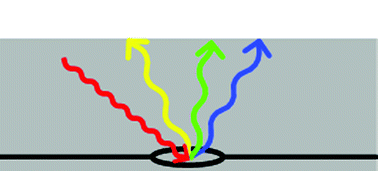
Phys. Chem. Chem. Phys., 2015,17, 21045-21045
https://doi.org/10.1039/C5CP90032H
Surface-enhanced IR absorption spectroscopy of the KcsA potassium channel upon application of an electric field
Surface-enhanced IR absorption spectroscopy coupled with an electrochemical system enables the potassium-induced specific structural change of the potassium channel.
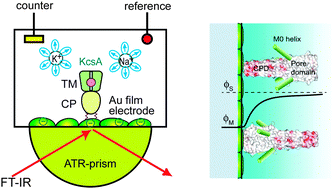
Phys. Chem. Chem. Phys., 2015,17, 21104-21111
https://doi.org/10.1039/C5CP02681D
Hybrid nanostructures for SERS: materials development and chemical detection
A perspective of recent developments on nanostructures composed of hybrid materials for SERS applications, including Chemical detection of analytes.

Phys. Chem. Chem. Phys., 2015,17, 21046-21071
https://doi.org/10.1039/C5CP01032B
In situ Raman and surface-enhanced Raman spectroscopy on working electrodes: spectroelectrochemical characterization of water oxidation electrocatalysts
This perspective article gives an overview of the current developments regarding the use of in situ Raman and surface-enhanced Raman spectroscopy on working electrodes for probing the fate of molecular and heterogeneous catalysts during electrochemical water oxidation.
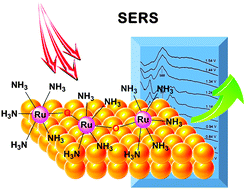
Phys. Chem. Chem. Phys., 2015,17, 21094-21103
https://doi.org/10.1039/C4CP05053C
Prospects for plasmonic hot spots in single molecule SERS towards the chemical imaging of live cells
Single molecule surface enhanced Raman scattering (SM-SERS) is a highly local effect occurring at sharp edges, interparticle junctions and crevices or other geometries with a sharp nanoroughness of plasmonic nanostructures (“hot spots”) for an analyte detection.
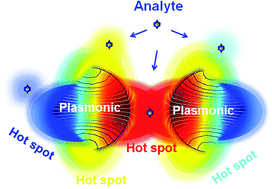
Phys. Chem. Chem. Phys., 2015,17, 21072-21093
https://doi.org/10.1039/C4CP04946B
An operando surface enhanced Raman spectroscopy (SERS) study of carbon deposition on SOFC anodes
Thermally robust SERS probes enable the study of coking kinetics on the nickel surface at early stages and at the Ni–YSZ interface.
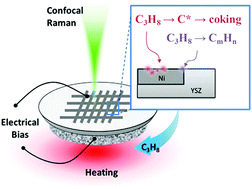
Phys. Chem. Chem. Phys., 2015,17, 21112-21119
https://doi.org/10.1039/C4CP05176A
Surface-enhanced Raman spectroscopy characterisation of functionalised multi-walled carbon nanotubes
By applying SERS, we recorded spectral features from functional molecules bound to the nanotube surface, which are otherwise very difficult to see.
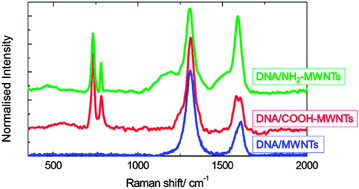
Phys. Chem. Chem. Phys., 2015,17, 21373-21380
https://doi.org/10.1039/C4CP05075D
Development of an electrochemical surface-enhanced Raman spectroscopy (EC-SERS) aptasensor for direct detection of DNA hybridization
Direct, label-free detection of DNA hybridization using EC-SERS.
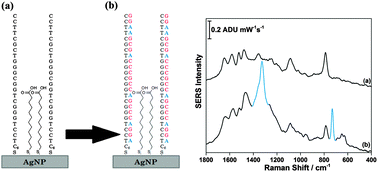
Phys. Chem. Chem. Phys., 2015,17, 21356-21363
https://doi.org/10.1039/C4CP05077K
The adsorption of thiophenol on gold – a spectroelectrochemical study
The adsorbate formed by adsorption of thiophenol on a polycrystalline gold electrode and brought into contact with aqueous solutions of 1 M HClO4 and 0.1 M KClO4 has been studied using cyclic voltammetry and surface-enhanced Raman spectroscopy.
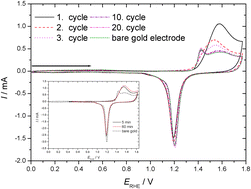
Phys. Chem. Chem. Phys., 2015,17, 21364-21372
https://doi.org/10.1039/C5CP00884K
Enhancement and extinction effects in surface-enhanced stimulated Raman spectroscopy
We address the optical physics of surface-enhanced stimulated Raman spectroscopy (SESRS) from the microscopic to macroscopic scales to provide experimental design criteria in colloidal-suspension SESRS.
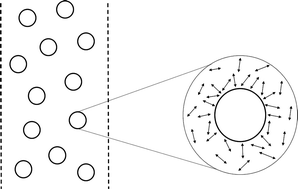
Phys. Chem. Chem. Phys., 2015,17, 21348-21355
https://doi.org/10.1039/C4CP05089D
An integrated superhydrophobic-plasmonic biosensor for mid-infrared protein detection at the femtomole level
In this work we present an integrated biosensor that enables FTIR (Fourier Transform-Infrared) detection of analytes contained in diluted solutions.
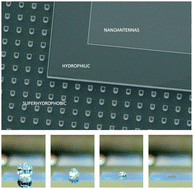
Phys. Chem. Chem. Phys., 2015,17, 21337-21342
https://doi.org/10.1039/C4CP05023A
Tip-enhanced Raman spectroscopy of graphene-like and graphitic platelets on ultraflat gold nanoplates
TERS was used to investigate the graphene-like platelets in gap mode geometry using radially and linearly polarized excitation.
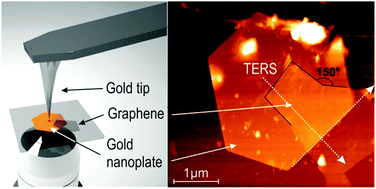
Phys. Chem. Chem. Phys., 2015,17, 21315-21322
https://doi.org/10.1039/C4CP05252H
High performance surface-enhanced Raman scattering from molecular imprinting polymer capsulated silver spheres
Driven by the ultrasensitivity of the surface-enhanced Raman scattering (SERS) technique and the directive selection of molecular imprinting polymers (MIPs), core–shell silver-molecularly imprinted polymer (Ag@MIP) hybrid structure was synthesized to serve as a novel SERS platform.
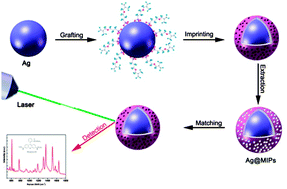
Phys. Chem. Chem. Phys., 2015,17, 21343-21347
https://doi.org/10.1039/C5CP00206K
Subpicosecond surface dynamics in genomic DNA from in vitro-grown plant species: a SERS assessment
Surface dynamics of selective molecular subgroups in DNA is about two times faster than the solution dynamics of nucleic acids.
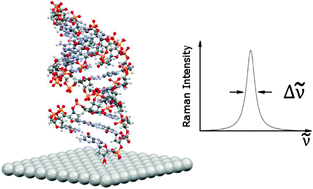
Phys. Chem. Chem. Phys., 2015,17, 21323-21330
https://doi.org/10.1039/C4CP05425C
SERS activity of Ag decorated nanodiamond and nano-β-SiC, diamond-like-carbon and thermally annealed diamond thin film surfaces
DLC and thermally annealed diamond thin films as SERS substrates without any metal nanostructures on their surfaces.
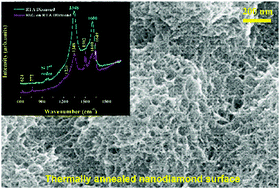
Phys. Chem. Chem. Phys., 2015,17, 21331-21336
https://doi.org/10.1039/C4CP05236F
Waveguide-coupled directional Raman radiation for surface analysis
Guided-mode-excited and guided-mode-coupled directional Raman spectroscopy can be used to obtain an ultrahigh depth resolution and thus an excellent surface selectivity.

Phys. Chem. Chem. Phys., 2015,17, 21278-21287
https://doi.org/10.1039/C4CP05092D
Image molecular dipoles in surface enhanced Raman scattering
Surface enhanced Raman spectroscopy is explained by considering interactions of molecular dipoles with their image charges formed in metal substrates.
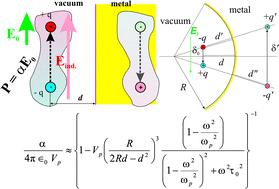
Phys. Chem. Chem. Phys., 2015,17, 21302-21314
https://doi.org/10.1039/C4CP05082G
Surface enhanced vibrational spectroscopy and first-principles study of L-cysteine adsorption on noble trimetallic Au/Pt@Rh clusters
First-principles study of L-cysteine adsorption on noble trimetallic Au/Pt@Rh clusters has been discussed in the light of SEIRS and theoretical surface complex calculation.
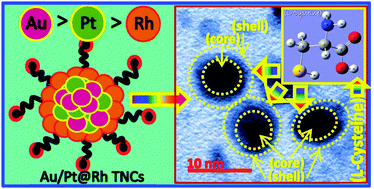
Phys. Chem. Chem. Phys., 2015,17, 21268-21277
https://doi.org/10.1039/C4CP05170J
Critical assessment of enhancement factor measurements in surface-enhanced Raman scattering on different substrates
The SERS enhancement factor (SERS-EF) is one of the most important parameters that characterizes the ability of a given substrate to enhance the Raman signal for SERS applications. The comparison between dynamic and static substrates, however, should not be performed in sense of SERS-EF.
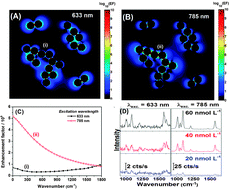
Phys. Chem. Chem. Phys., 2015,17, 21294-21301
https://doi.org/10.1039/C4CP05080K
Nonlinear optical imaging of single plasmonic nanoparticles with 30 nm resolution
Femtosecond-scanning near-field optical microscopy resolves the location-correlated second harmonic generation and two-photon photoluminescence from single nanoparticles with 30 nm resolution.

Phys. Chem. Chem. Phys., 2015,17, 21288-21293
https://doi.org/10.1039/C4CP05342G
Synthesis of size-tunable chitosan encapsulated gold–silver nanoflowers and their application in SERS imaging of living cells
Monodispersed and biocompatible SERS tags are conveniently developed by one-pot synthesis and applied for cancer cell targeting and SERS imaging.
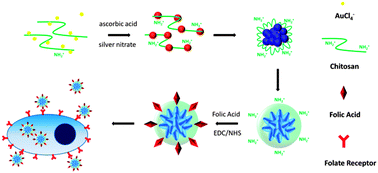
Phys. Chem. Chem. Phys., 2015,17, 21261-21267
https://doi.org/10.1039/C4CP05343E
Preparation of a silver nanoparticle-based dual-functional sensor using a complexation–reduction method
A dual-functional sensor based on silver nanoparticles was synthesized by a two-stage procedure consisting of a low-temperature chitosan–Ag+ complexation followed by a high-temperature reduction of the complex to form chitosan-capped silver nanoparticles (CS-capped Ag NPs).
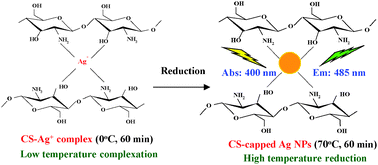
Phys. Chem. Chem. Phys., 2015,17, 21243-21253
https://doi.org/10.1039/C4CP05012F
Droplet based microfluidics: spectroscopic characterization of levofloxacin and its SERS detection
The determination of the absorption behavior of levofloxacin (levaquin) on the surface of silver nanoparticles and its determination in aqueous solution by droplet based microfluidics combined with surface enhanced Raman spectroscopy.

Phys. Chem. Chem. Phys., 2015,17, 21236-21242
https://doi.org/10.1039/C4CP04970E
Surface enhanced Raman scattering of a single molecular junction
Surface enhanced Raman scattering of a single molecular junction together with the conductance measurements.
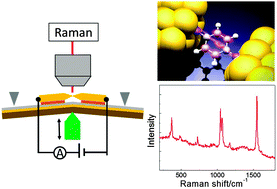
Phys. Chem. Chem. Phys., 2015,17, 21254-21260
https://doi.org/10.1039/C4CP04906C
Improved Raman and photoluminescence sensitivity achieved using bifunctional Ag@SiO2 nanocubes
Surface-enhanced Raman scattering (SERS) and metal-enhanced photoluminescence (MEPL) responses can be greatly improved by introducing a thin coating of silica (SiO2) on silver nanocubes.
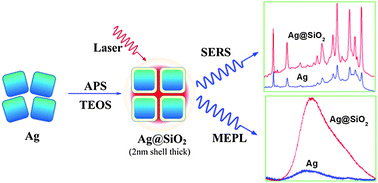
Phys. Chem. Chem. Phys., 2015,17, 21226-21235
https://doi.org/10.1039/C4CP05217J
Calculating average surface enhancement factors of randomly nanostructured electrodes by a combination of SERS and impedance spectroscopy
Simultaneous use of SERS and impedance spectroscopy allows determining electromagnetic field enhancement factors of electrode surfaces with random nanostructures.

Phys. Chem. Chem. Phys., 2015,17, 21220-21225
https://doi.org/10.1039/C4CP05015K
Tailoring plasmonic properties of gold nanohole arrays for surface-enhanced Raman scattering
The wide plasmonic tuning range of nanotriangle and nanohole array patterns fabricated by nanosphere lithography makes them promising in surface-enhanced Raman scattering (SERS) sensors.
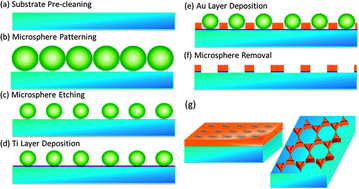
Phys. Chem. Chem. Phys., 2015,17, 21211-21219
https://doi.org/10.1039/C4CP05291A
Surface- and tip-enhanced resonant Raman scattering from CdSe nanocrystals
Electromagnetic enhancement of CdSe quantum dots in surface and tip-enhanced Raman scattering with improved sensitivity.

Phys. Chem. Chem. Phys., 2015,17, 21198-21203
https://doi.org/10.1039/C4CP05087H
Far- and near-field properties of gold nanoshells studied by photoacoustic and surface-enhanced Raman spectroscopies
The knowledge of the near- and far-field spectral distribution helps in choosing the most performing metal nanostructure for advanced applications.
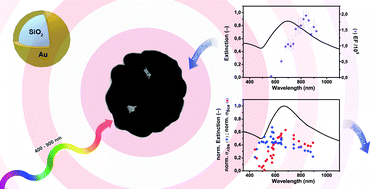
Phys. Chem. Chem. Phys., 2015,17, 21190-21197
https://doi.org/10.1039/C4CP05054A
Particle size dependence of the surface-enhanced Raman scattering properties of densely arranged two-dimensional assemblies of Au(core)–Ag(shell) nanospheres
Densely arranged two-dimensional assemblies of larger plasmonic Au(core)–Ag(shell) nanospheres promising for the development of highly sensitive SERS sensor platforms.
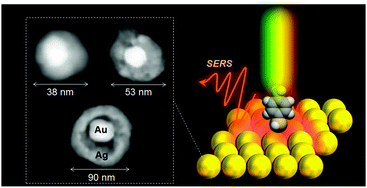
Phys. Chem. Chem. Phys., 2015,17, 21182-21189
https://doi.org/10.1039/C4CP05058D
Different behaviour of molecules in dark SERS state on colloidal Ag nanoparticles estimated by truncated power law analysis of blinking SERS
Power law analysis of blinking SERS can estimate the behaviour of thiacyanine in dark SERS state on the Ag surface with a large or small amount of citrate anions.
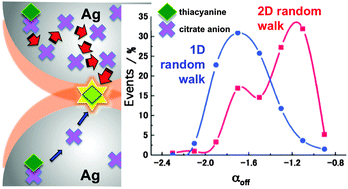
Phys. Chem. Chem. Phys., 2015,17, 21204-21210
https://doi.org/10.1039/C4CP05070C
A near field optical image of a gold surface: a luminescence study
We have used the luminescence from a gold tip to study the optical near field properties of a gold surface.
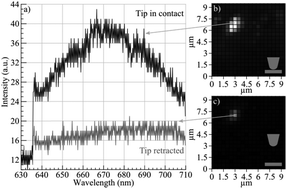
Phys. Chem. Chem. Phys., 2015,17, 21176-21181
https://doi.org/10.1039/C4CP05000B
Impact of the plasmonic near- and far-field resonance-energy shift on the enhancement of infrared vibrational signals
SEIRA signals have a Fano-type line shape and the enhancement maximum is red shifted compared to the plasmonic far-field resonance.
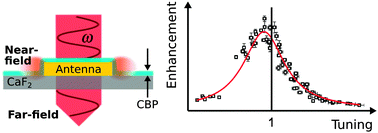
Phys. Chem. Chem. Phys., 2015,17, 21169-21175
https://doi.org/10.1039/C4CP04851B
Bio-sensing with butterfly wings: naturally occurring nano-structures for SERS-based malaria parasite detection
A gold-coated butterfly wing is used as a SERS substrate to diagnose malaria based on intense scattering from hemozoin aggregates.
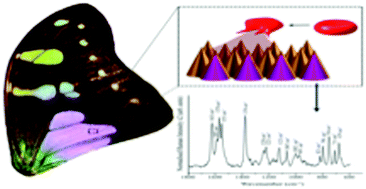
Phys. Chem. Chem. Phys., 2015,17, 21164-21168
https://doi.org/10.1039/C4CP04930F
Gold and silver nanoparticle monomers are non-SERS-active: a negative experimental study with silica-encapsulated Raman-reporter-coated metal colloids
Spherical metal nanoparticle colloids prepared at low centrifugation speed show that the monomers are not SERS-active at the ensemble level.
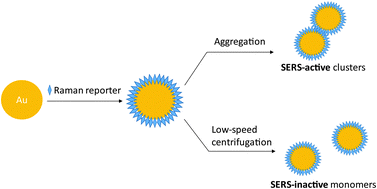
Phys. Chem. Chem. Phys., 2015,17, 21120-21126
https://doi.org/10.1039/C4CP05073H
CTAB micelles assisted rGO–AgNP hybrids for SERS detection of polycyclic aromatic hydrocarbons
A facile and convenient strategy to detect polycyclic aromatic hydrocarbons is presented, using graphene–Ag nanoparticle hybrids as a surface-enhanced Raman scattering substrate.
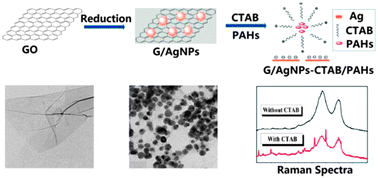
Phys. Chem. Chem. Phys., 2015,17, 21158-21163
https://doi.org/10.1039/C4CP04888A
β-Cyclodextrin coated SiO2@Au@Ag core–shell nanoparticles for SERS detection of PCBs
A new type of surface-enhanced Raman scattering (SERS) substrate consisting of β-cyclodextrin (β-CD) coated SiO2@Au@Ag nanoparticles (SiO2@Au@Ag@CD NPs) has been achieved.
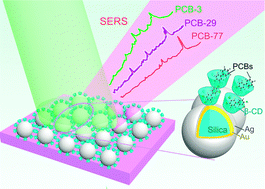
Phys. Chem. Chem. Phys., 2015,17, 21149-21157
https://doi.org/10.1039/C4CP04904G
Pressure-enhanced surface interactions between nano-TiO2 and ionic liquid mixtures probed by high pressure IR spectroscopy
The formation of pressure-enhanced C–H⋯nano-TiO2 interactions around the C–H groups was observed.
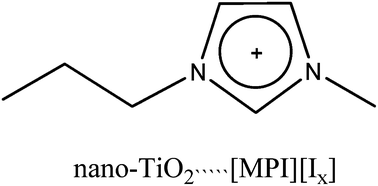
Phys. Chem. Chem. Phys., 2015,17, 21143-21148
https://doi.org/10.1039/C4CP04768K
Plasmonic properties of regiospecific core–satellite assemblies of gold nanostars and nanospheres
Regiospecific star-sphere assemblies show enhanced SERS intensity and electric field at the interparticle junction as well as at locations between the nanostar tips.
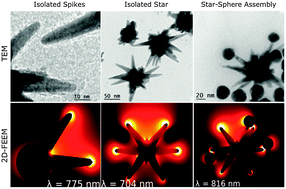
Phys. Chem. Chem. Phys., 2015,17, 21133-21142
https://doi.org/10.1039/C4CP04517C
Enhanced-fluorescence correlation spectroscopy at micro-molar dye concentration around a single gold nanorod
Field enhancement by a single gold nanorod enables μM dye solution FCS (red). The solution itself gives no signal (green).
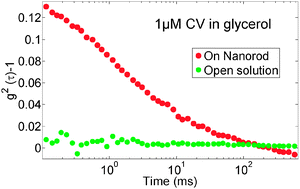
Phys. Chem. Chem. Phys., 2015,17, 21127-21132
https://doi.org/10.1039/C4CP03057E
About this collection
The combination of molecular spectroscopies based on infrared absorption, Raman scattering, and fluorescence emission with metal nanostructures generating very high locally increased electric fields upon resonant excitation, has led to novel types of spectroscopies with promising technological applications. There has been recent progress in in many different fields, but there is an urgent need for bringing together scientists from these various disciplines (physics, chemistry, materials science, engineering, life sciences) together. This themed issue aims to cover the full range of topics from fundamentals to methods and applications bringing together leading scientists from all of the involved fields.
The Guest Editors for this themed collection are Rudolf Holze (Chemnitz University of Technology, Germany) and Sebastian Schlücker (University of Duisburg-Essen, Germany).